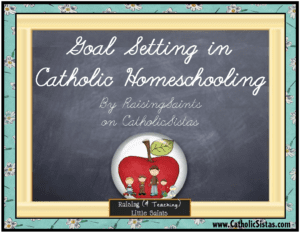Before setting your goals for your homeschool take a moment first to make a list of why you want to this. Once your list is completed, circle or highlight all of the most important or positive points from your list. Think of this list as writing your own defense ahead of time against naysayers. This way, if someone questions you about your decision, you now have a list in your head of well thought out reas ons as to why you are now homeschooling. This list should be composed by you and your spouse so that you both are on the same page from the start. If your children are older, you may also want to include their reasons as well. Including the children from the onset also helps them explain why you have chosen this as a family. It will equip them with reasons should anyone ask them (believe it or not even strangers will ask them). So what should be in your educational philosophy statement? You should ask yourself the following two questions:
ons as to why you are now homeschooling. This list should be composed by you and your spouse so that you both are on the same page from the start. If your children are older, you may also want to include their reasons as well. Including the children from the onset also helps them explain why you have chosen this as a family. It will equip them with reasons should anyone ask them (believe it or not even strangers will ask them). So what should be in your educational philosophy statement? You should ask yourself the following two questions:
- Why are you homeschooling? (tip: do not stick to only the negative reasons)
- What is it that you would like to accomplish with your children? (hint: think in general terms mostly)
- What are your children’s gifts and/or impediments?
Now grab this list and create a one to two paragraph Mission Statement. This will also come in handy to re-read on those more challenging days. Now that you have an Philosophy Statement written, you are now ready to start setting goals. This is long term goal setting. Now think of the specifics of how you will accomplish your statement. Make five lists under these categories:
1. religious goals – obviously, have to do with matters of Faith and the Church
2. increase in virtue goals – have to do with those things that teach manners and build character
3. academic goals – depends on what each child’s abilities are
4. extracurricular goals – join teams, choir, co-ops
5. social goals – sometimes covered in other areas but still important to incorporate
Since some states require you to submit your goals when you begin homeschooling, this list will come in handy. Make sure your goals are realistic, you don’t want to set yourself up for failure from the start. Here are some examples of each goal by category:
1. Religious Goals:
- go to daily Mass
- go to monthly Confession
- get son involved in altar serving
- get children to join the Church choir or schola
- follow the liturgical calendar; follow it more closely
2. Increase in Virtues Goals:
- children to be polite and use appropriate responses in conversations
- sit correctly at the table and learn appropriate table manners
- learn to be helpful around the house with chores
- to be charitable with others specially parents and siblings
- to learn to be appreciative of what God has provided us
3. Academic Goals:
- have child needing testing for learning issues or possible high IQ
- complete a grade level within the required time frame such as 180 days or 9 months
- advance student in area(s) they are gifted in
- support student in areas where there are gaps or having difficulty with
- attend therapies for those students needing it such as occupational therapy, speech, and reading remeditation
(You can also look up any of the Scope and Sequence of any of the Catholic Curriculum providers for ideas in this goal and then tweak it for your family.)
4. Extracurricular Goals:
- look into getting involved in a co-op in your area so that students can participate in group activities
- find out about clubs like Blue Knights or Little Flowers
- join a sports team or individual sports like tennis or swimming (some offer programs during the day for homeschoolers)
- take music lessons individually or as a group
- participate in a homeschool band
5. Social Goals:
- join a manners class or class like the Junior Cotillion League
- join a youth group, if of age or participate at your parish’s events for kids
- attend events at your parish for families
- go to the park, you’ll be amazed how many other homeschooled families you will meet there
- join a play date group
In conclusion, setting goals will help create a vision for what you and your spouse would like for your homeschool to be like and also it will give you a list of well thought out reasons in case anyone questions you. It will help you feel more confident about your decision to Catholic Homeschool. This list is also a great thing to have around and revisit, and possibly tweak, each school year. Having goals written will help you and your children stay focused, motivated, and on task. Describe four enabling goals needed to achieve the long-term goal. Keep it to four or five minimum as each year you will set more age/grade specific ones. Each year you should use these goals as the foundation for whatever curriculum or yearly goals you set for your children.
 What’s Next in the Catholic Homeschooling 101 Series? Next week we are going to discuss homeschooling methods. I really like the way that Catie over at Our Catholic Homeschool has set her’s up by style and then the pros and cons. I suggest you visit her blog and see what she did to get an idea.
What’s Next in the Catholic Homeschooling 101 Series? Next week we are going to discuss homeschooling methods. I really like the way that Catie over at Our Catholic Homeschool has set her’s up by style and then the pros and cons. I suggest you visit her blog and see what she did to get an idea.
Did you miss our past posts?
